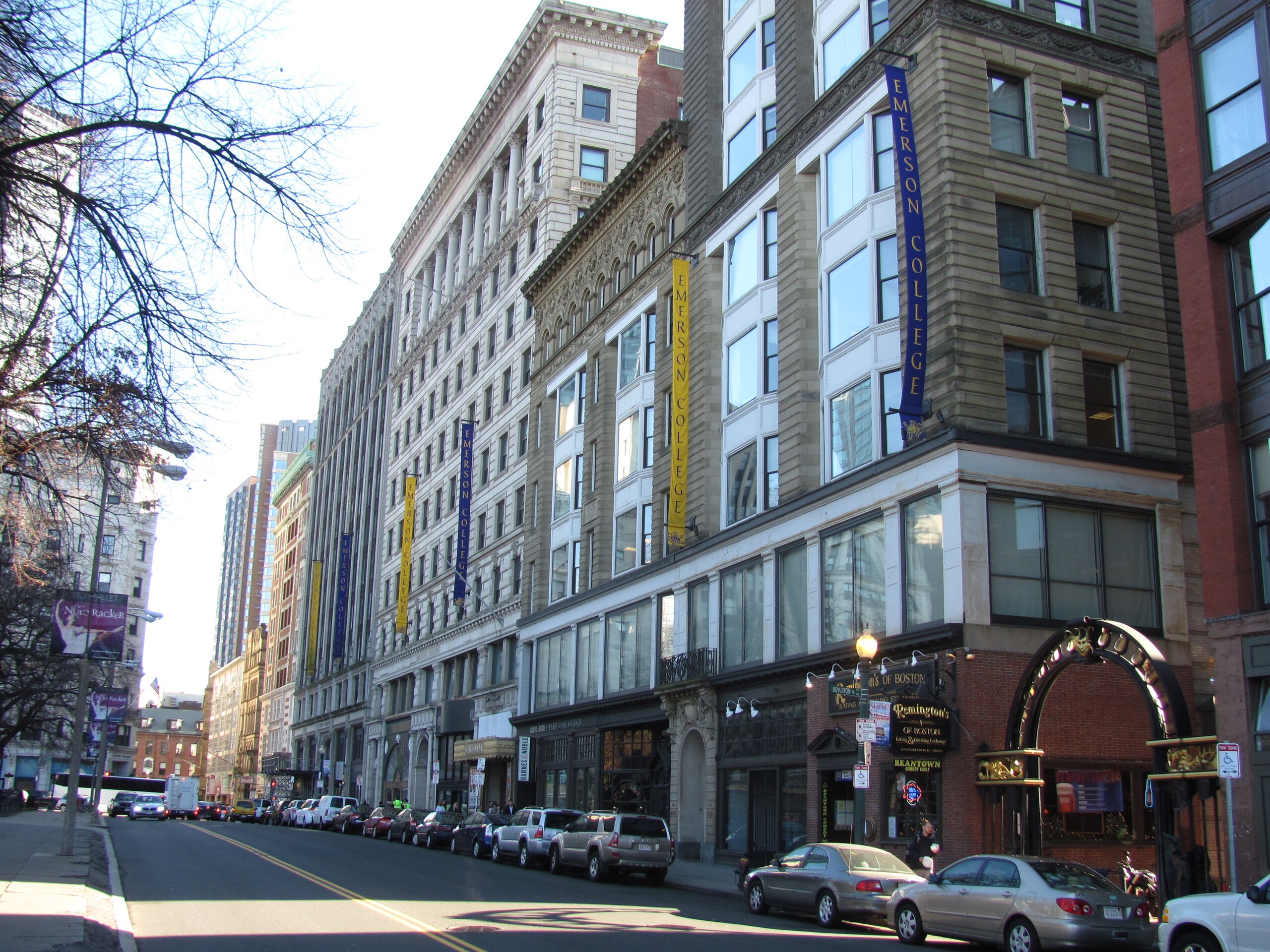April 30, 2024
I’m a writer. Words on the page are my first and best expression of my life, my emotions, and my world. This time, I have almost nothing. One too many of the people I try to explain all of this to has acted like a lawyer or a politician. They’re ignoring the blood.
Emerson College is a tiny school. We have a city block’s worth of buildings to our name, without so much as a quad to gather in. All we have for outdoor crowds is 2B Alley, a strip of brick between Boylston Street and the MBTA building. We’re enterprising, so we make do. People gather in the Common, or in one another’s cramped dorm rooms, or around the end of a long table in the dining hall. We’re very good at capitalizing on space.
The encampment was a prime example of Emerson students working with what we have. The city and the school told everyone they were a hazard, blocking the path, but the protesters moved as easily as water to make room for foot traffic and doors opening into the alley. I use a cane part-time and it was actually easier to walk through the encampment—full of conscientious people, of thoughtful people—than it is to walk through normal crowds. I have never felt community here at Emerson like I felt in the encampment, even as someone who was just passing through. They celebrated Passover together. They made friendship bracelets and held a jam session, they gave speeches and performed slam poetry. They held full-on classes on Palestinian history with each other and with passersby. This was more than a gathering. It was education and solidarity. When people were unable to stay full-time, they accommodated. When donations overflowed, they gave food and water and shelter to the nearby homeless. When they were harassed—and I know they were, as I was a witness—they never responded in kind. I felt safe in that alley even late at night when Boston is normally more dangerous.
My window is right above the alley. I heard when chanting and singing turned to screams. I remember registering the change and sitting bolt upright in bed and praying to any god who would take me that they were okay. My worst fear since the encampment began was hearing gunshots from that alley. I can only be thankful that no one was killed.
I attended a general assembly the next day, where several people gave their eyewitness testimonies of the raid, and I’ll be frank: The only stories more sickening than the ones I heard there are the ones I hear coming out of the active war zone. One student’s arm was broken by police and he did not receive medical attention for hours. Another was thrown over a table. A girl my age cried on the stand describing how she was choked and bruised by five cops surrounding her. One student was charged with trespassing—on public property! Over a hundred cops in full riot gear tore through a peaceful protest and brutalized peaceful students. GBH News and several other papers ran stories about the raid, and I foolishly thought they would tell the truth. Only four officers injured, they said. No students.
If we don’t show solidarity, then we let hope die faster.
Broken bones. Choking and suffocating. Throwing and hitting and crushing to the ground.
The city had to wash the blood of students off the ground, and both it and Emerson are pretending nothing happened.
The average Emerson student is five foot nothing of thrifted jeans and dyed hair. I’ve seen housecats more threatening than my peers. The encampment had a button-making machine and a bubble blower and boxes of chalk. Someone brought an acoustic guitar—oh, the horror! Is that a threat? Is that something over a hundred trained police officers in full riot gear are so afraid of that they need to destroy it? 118 students. 118 students.
For 24 hours after the raid, I didn’t leave my room. I stayed in bed and scoured the news for familiar names. I found none, which didn’t help. I eventually had to leave to get food the next morning, and the only way to exit my building and go to the dining hall was to cross the alley. It was like walking through a crowd of ghosts. There were still traces of chalk dust in the corners, but that was it. The silence pressed down onto my ears like a physical force. Wet paint signs were plastered on the walls—my, my, how fast infrastructure moves to cover up resistance—and multiple posters read NO PROTESTS IN THIS ALLEY in bold. The encampment had been scrubbed like so much grease from a pan, with even more disgust, by the authorities and by the college. I felt its absence like a death in the family.
But we didn’t stop. Emersonians got back up, dusted each other off, and went at it even harder. The arrested students projected their voices and the rest of us held up the megaphones and the college finally acknowledged the horror. Signs and chalk art sending solidarity to Gaza have sprung up in the alley in protest once more.
If we don’t protest, we will have let the atrocities of Israel and the silence of our institution pass uncontested. If we don’t show solidarity, then we let hope die faster. No one in the encampment thought they could stop Israel directly—but they knew they could influence their peers, the college, and even the city. We wanted to speak up and make it known that we will not stand for this. Even the smallest piece of resistance is still resistance.
People in Gaza heard about us. They know they’re not alone in the world. It’s small, but it’s important. ![]()
Emmett Savage is the pen name of an undergraduate at Emerson College.
Featured image of the entrance to 2B Alley at Emerson College via Wikimedia Commons (CC BY 3.0).

